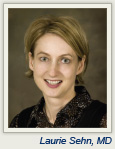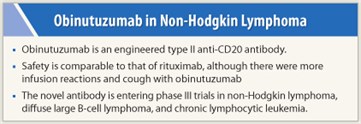The new anti-CD20 monocolonal antibody obinutuzumab is being studied in the treatment of patients with relapsed CD20-positive indolent B-cell non-Hodgkin lymphoma. GAUSS is the first clinical trial to compare obinutuzumab head-to-head against rituximab (Rituxan) induction therapy.
 “In this first head-to-head trial, we are encouraged to see a trend toward higher response rates without appreciable differences in safety. Given the promising efficacy of this drug, definitive phase III trials are currently underway,” said Laurie Sehn, MD, Clinical Associate Professor at the University of British Columbia and the British Columbia Cancer Center Agency, Center for Lymphoid Cancer, Vancouver, Canada, at the 53rd Annual Meeting of the American Society of Hematology in San Diego.1
“In this first head-to-head trial, we are encouraged to see a trend toward higher response rates without appreciable differences in safety. Given the promising efficacy of this drug, definitive phase III trials are currently underway,” said Laurie Sehn, MD, Clinical Associate Professor at the University of British Columbia and the British Columbia Cancer Center Agency, Center for Lymphoid Cancer, Vancouver, Canada, at the 53rd Annual Meeting of the American Society of Hematology in San Diego.1
Study Design
Obinutuzumab is the only engineered type II monoclonal anti-CD20 antibody to enter clinical trials thus far. The open-label phase II GAUSS study randomly assigned 149 patients with follicular lymphoma to induction therapy with four courses of rituximab at 375 mg/m2 per week or obinutuzumab at 1,000 mg. Patients who had progressive disease following induction went off study; the remainder continued on maintenance therapy every 2 months for 2 years with the same drug they were assigned to for induction therapy.
Median age was about 61 years, about 50% of patients were male, and about 80% had stage III/IV disease. Disease characteristics between the two arms were generally comparable.
Principal Findings
 Both investigator review and independent radiology review found higher overall response rates at the end of induction with obinutuzumab compared with rituximab: Investigator review found an overall response rate of 44.6% with obinutuzumab vs 33.3% with rituximab; and complete remission (plus unconfirmed complete response) rates of 12.2% vs 5.2%, respectively. Best overall response as determined by independent review was 60.8% for obinutuzumab vs 46.7% for rituximab, a statistically significant difference of 14.1% in favor of the novel agent (P = .04). At a median follow-up of 15 months, no difference in progression-free survival was seen, but follow-up was too short to detect a difference, Dr. Sehn said.
Both investigator review and independent radiology review found higher overall response rates at the end of induction with obinutuzumab compared with rituximab: Investigator review found an overall response rate of 44.6% with obinutuzumab vs 33.3% with rituximab; and complete remission (plus unconfirmed complete response) rates of 12.2% vs 5.2%, respectively. Best overall response as determined by independent review was 60.8% for obinutuzumab vs 46.7% for rituximab, a statistically significant difference of 14.1% in favor of the novel agent (P = .04). At a median follow-up of 15 months, no difference in progression-free survival was seen, but follow-up was too short to detect a difference, Dr. Sehn said.
Overall, the novel agent was well tolerated but produced a higher rate of infusion reactions (generally mild and transient) that did not significantly affect treatment discontinuation. Adverse events were similar between the two arms, with the exception of more infusion-related reactions and cough in the obinutuzumab arm: 74% vs 51% for infusion-related reactions and 21% vs 6% for cough. Twelve patients on each arm experienced severe adverse events on treatment (induction and maintenance).
The phase III program includes two major trials launched recently; one trial will compare chemotherapy plus rituximab vs chemotherapy plus obinutuzumab in advanced-stage non-Hodgkin lymphoma, and the second trial will compare standard R-CHOP (rituximab plus cyclophosphamide, doxorubicin, vincristine, and prednisone) vs obinutuzumab plus CHOP in diffuse large B-cell lymphoma. Other trials are planned in chronic lymphocytic leukemia.
Engineered Antibody
Commenting on the study, Jane N. Winter, MD, moderator of the press conference where these results were presented, said, “This agent has been engineered for enhanced performance. The study doesn’t definitively show obinutuzumab is better than rituximab, but the efficacy is promising enough to warrant phase III trials comparing it to rituximab.” Dr. Winter is Professor of Medicine at the Feinberg School of Medicine, Northwestern University, Chicago. ■
Disclosure: Dr. Sehn is a consultant for and has received honoraria and research support from Roche/Genentech. Dr. Winter reported no potential conflicts of interest.
Reference
1. Sehn L, Goy A, Offner, FC, et al: Randomized phase II trial comparing GA101 (obinutuzumab) with rituximab in patients with relapsed CD20+ indolent B-cell non‑Hodgkin lymphoma: Preliminary analysis of the GAUSS study. 53rd Annual Meeting of the American Society of Hematology. Abstract 269. Presented December 12, 2011.

